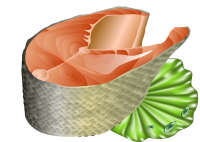Content may contain advertising or affiliate links.
The Paleo diet, also known as the Paleolithic or Caveman diet, has gained significant popularity in recent years. This dietary approach focuses on consuming foods that mimic those of our ancient ancestors from the Paleolithic era.
The paleo diet emphasizes lean proteins, fruits, and vegetables while being low in sodium content. Following this plan may lead to weight loss by eliminating processed food products high in calories and sodium.

Origin
The Paleolithic era, commonly referred to as the Stone Age, spanned from approximately 2.6 million to 10,000 years ago. During this period, early humans relied on hunting, gathering, and foraging for their sustenance. Their diet predominantly consisted of wild game, fish, fruits, vegetables, nuts, and seeds, as processed foods, grains, and dairy were non-existent at that time.
The concept of the Paleo diet was first popularized by Dr. Walter L. Voegtlin, a gastroenterologist, in the 1970s. Dr. Voegtlin believed that our bodies are genetically adapted to the diet our ancestors followed during the Paleolithic era and that consuming modern processed foods leads to various health issues.
However, it was not until the early 2000s that the Paleo diet gained widespread attention, thanks to the publication of a book called “The Paleo Diet” by Dr. Loren Cordain. Dr. Cordain extensively researched the evolutionary history of human nutrition and emphasized the importance of consuming natural, unprocessed foods to optimize our health.
Fruits
Paleo fruits are known for their high nutritional content, making them an excellent choice for maintaining a balanced diet. For instance, berries like blueberries, strawberries, and raspberries are loaded with antioxidants that promote overall health and fight inflammation. These delicious gems can be enjoyed as a refreshing snack or added to smoothies and salads for an extra burst of flavor.
Paleo fruits not only provide a natural sweetness but also enhance the flavors of various dishes. From tropical fruits like mangos and pineapples, to apples, pears, and citrus fruits, the options are endless. Incorporating these fruits into your paleo recipes can add a vibrant twist to your meals, whether it’s a fruity salsa accompanying grilled chicken or a refreshing fruit salad to complement your breakfast.
While fruits are generally considered healthy, it’s essential to strike a balance, especially when following a paleo diet. While the natural sugars present in fruits are generally better for your health compared to refined sugars, portion control is still crucial. Moderation is the key to maintaining a healthy blood sugar level and avoiding potential insulin spikes.
Vegetables
Vegetables are a vital component of the Paleo diet as they provide essential nutrients, fiber, and antioxidants. They are low in calories and high in vitamins, minerals, and phytochemicals, making them an excellent choice for maintaining optimal health. Vegetables like carrots, sweet potatoes, and asparagus are excellent sources of dietary fiber, which can contribute to improved gut health and better overall digestion.
Vegetables such as leafy greens (spinach, kale, and Swiss chard), cruciferous vegetables (broccoli, cauliflower, and Brussels sprouts), and colorful bell peppers are packed with vitamins A, C, and K, along with minerals like potassium and magnesium. These nutrients are essential for maintaining healthy skin, supporting the immune system, and promoting proper bone health.
Eggs
Eggs are often considered a nutritional powerhouse, making them an ideal addition to the paleo diet. They are rich in high-quality protein, essential vitamins, minerals, and healthy fats. Moreover, eggs are naturally gluten-free, making them suitable for individuals following a grain-free paleo lifestyle.
Eggs contain a wide array of essential vitamins and minerals. They are particularly rich in vitamins A, D, E, and B-complex vitamins like B12, biotin, and choline. These nutrients contribute to healthy skin, strong bones, improved brain function, and enhanced energy levels. Additionally, eggs are a good source of minerals such as iron, selenium, and zinc, which are necessary for various bodily functions.
Eggs are an easily adaptable food to incorporate into a range of Paleo dishes. From hard boiling, poaching, scrambling or using them as part of an omelet recipe, eggs offer versatility!

Meat And Fish
Meat provides your body with not only protein, but also omega-3 fatty acids that reduce inflammation and protect the heart. These fats can be found in grass-fed meat like chicken and beef, as well as wild seafood like salmon. This can also be found in nuts butters, olive oil, and avocados.
Lean grass-fed beef is a staple in the Paleo diet and provides a rich source of essential nutrients. Compared to conventionally raised beef, grass-fed beef contains higher levels of omega-3 fatty acids, which are beneficial for heart health. Additionally, it is packed with protein, iron, zinc, and vitamin B12. Including grass-fed beef in your Paleo meal plan not only supports muscle growth but also promotes overall well-being.
Free-range chicken is another protein-packed meat that is embraced by those following the Paleo lifestyle. These chickens are raised in a more natural environment and have access to pasture, allowing them to consume a more varied diet. As a result, the meat from free-range chickens tends to be leaner and higher in omega-3 fatty acids.
Pasture-raised pork is a flavorful addition to the Paleo diet, offering a range of essential nutrients. Compared to factory-farmed pork, pasture-raised pork contains higher levels of omega-3 fatty acids and vitamins such as vitamin E and vitamin D. It also provides a good amount of high-quality protein and minerals like iron and zinc. When sourcing pork for your Paleo meals, opt for pasture-raised varieties to ensure you receive the maximum nutritional benefits.
Fish, especially those that are wild-caught, are an integral part of the Paleo diet. Fish such as salmon, mackerel, sardines, and trout are rich in omega-3 fatty acids, which have been associated with numerous health benefits, including reduced inflammation, improved brain function, and heart health. These fatty acids are essential for the body and are not produced naturally, making fish an excellent source to obtain them. Incorporating wild-caught fish into your Paleo meal plan twice a week can provide a significant boost to your overall health.
Nuts And Seeds
Nuts and seeds are nutrient-dense foods that offer a wide range of vitamins, minerals, and antioxidants. Almonds, for example, are rich in vitamin E, magnesium, and healthy monounsaturated fats, which are known to promote cardiovascular health. Chia seeds, on the other hand, are packed with omega-3 fatty acids, fiber, and protein, making them a great addition to support brain function and satiety.
The Paleo diet emphasizes the consumption of healthy fats, and nuts and seeds perfectly fit the bill. These natural sources of fats provide a good balance of monounsaturated and polyunsaturated fats, which are essential for brain health and reducing inflammation in the body. Walnuts, flaxseeds, and macadamia nuts are particularly high in omega-3 fatty acids, which play a crucial role in maintaining heart health.
Practical Paleo
Benefits
Paleo diet plans provide a key advantage by restricting empty calorie consumption such as sodas, energy drinks and juices, which contain large quantities of sugar while offering no nutritional benefit to their consumption. Water, herbal tea and unsweetened coffee are encouraged instead.
This diet may also help you shed extra weight, by encouraging you to consume high-protein, low-carbohydrate meals that tend to be lower in calorie count than many other meal plans. But be careful of your calorie consumption, since this plan tends to have more saturated fat than others.
The Paleo diet tends to be lower in sodium than other eating plans and promotes higher potassium intake. This combination may help improve blood pressure in those suffering from hypertension, as well as reduce triglyceride levels and raise “good” cholesterol levels.

Paleo Vs Mediterranean
Both the Paleo and Mediterranean diets have been associated with various health benefits, although they focus on different aspects. The Paleo diet is often praised for its ability to support weight loss, improve blood sugar control, and reduce inflammation. On the other hand, the Mediterranean diet has been extensively studied for its positive effects on heart health, cognitive function, and longevity.
The Paleo diet is often described as a high-protein, high-fat, and low-carbohydrate diet. It promotes the consumption of protein-rich foods like meat and fish, healthy fats such as avocados and nuts, and restricts the intake of carbohydrates from grains and starchy vegetables.
In contrast, the Mediterranean diet is more balanced in terms of macronutrient composition. It includes a moderate intake of all macronutrients, with a focus on healthy fats from olive oil and nuts, moderate protein from fish and legumes, and complex carbohydrates from whole grains, fruits, and vegetables.
Another crucial aspect to consider when choosing a diet is its sustainability and practicality in everyday life. The Mediterranean diet, with its wide array of food choices and flexible approach, is often considered easier to follow long-term. Its emphasis on whole foods and cultural traditions makes it more accessible for people from different backgrounds. Conversely, the Paleo diet’s strict rules and exclusion of certain food groups may be more challenging to adhere to in the long run.
The history and origin of the Paleo diet can be traced back to our ancient ancestors, who relied on natural, unprocessed foods for sustenance. The modern adaptation of this diet aims to emulate the dietary patterns of our Paleolithic predecessors. While the Paleo diet has gained popularity for its potential health benefits, it is essential to approach it with caution, ensuring a balanced intake of nutrients based on individual needs and preferences. As with any dietary approach, consulting a healthcare professional or registered dietitian is recommended before making significant changes to your eating habits.
